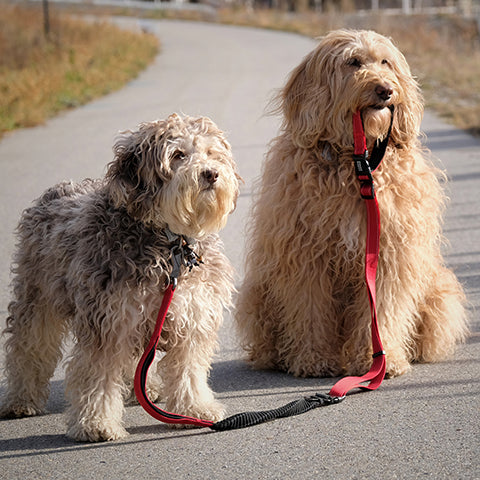
What can dogs not eat? The answer to that question is not a simple one. Dogs are more like humans, can have food allergies and various food intolerances. So it's not uncommon for dogs to steer clear of specific foods. But there are also a few foods that your dog shouldn't eat, at least not regularly.
Puppies are just adorable little creatures that love to get into everything and anything they can. While sometimes this is cute, it can also be disastrous if they eat something that might harm them.
What Can Dogs Not Eat?
Dogs are carnivores, and as a result, they should be fed a high protein diet consisting of around 60% meat. However, dogs do well on various foods, such as kibble, canned food, and dry food. Ensuring your dog's diet includes the right amounts of protein, fats, carbohydrates, vitamins, and minerals is essential.
And while treats may be tasty to humans, they're just as appealing to dogs who will happily chow down on anything they can get their paws on.
What are Human Foods That Dogs Can Eat?
After all, dogs are considered man's best friend, so why wouldn't you want to share your snacks with them? What does a dog think about food anyway?
Most dogs will eat about anything that humans eat. They will go for chips, ice cream, popcorn, and other snacks. They love sugar and fat, which is why bacon makes such a great treat for them. But just because they like it doesn't mean that they should be allowed to have it. There are many human foods that dogs shouldn't eat at all.
So what are the human foods that dogs can eat? The best rule for feeding your dog is to consume food specifically made for him. Snacks like ice cream or cookies may be tasty to your dog, but they won't do much good for his body. However, some foods are good treats for your dog. Here are a few of those:
Cooked Meat
Cooked meats make an excellent treat for dogs because they contain proteins and fats that help keep bodies healthy and strong. Cooked chicken is good as long as it's well done so that it's not going to harm the dog.
Breakfast Bars
Try to avoid giving your dog breakfast bars that are meant for human consumption, as some may contain ingredients such as raisins, chocolate, or sugar that could be toxic for dogs. However, if you're on the go or your dog has been fed recently, you could give him a low-sugar cereal bar with no chocolate or raisins like Cheerios or Special K.
Peanut Butter
Slather peanut butter on the outside of your dog's favorite toy for extra entertainment and fun. Peanut butter can be toxic for dogs or contains xylitol, an artificial sugar found in many sugarless gums, candy, and toothpaste if eaten in large amounts.
Lettuce
Dogs love lettuce! Steer clear of iceberg lettuce—it has little nutritional value—and opt for Romaine or red leaf lettuce. You can try grilling it with a bit of olive oil or tossing it in with their other salad greens to add some flavor. Don't forget the dressing either!
Can Dogs Eat Bananas?

Can dogs eat bananas? Yes. Bananas are safe and can help with digestion. Bananas are high in fiber, so they help to keep your dog regular and prevent constipation. These are healthy sources of potassium, which can help with muscle control and heart function. These also contain tryptophan, which is a natural sedative.
Can Dogs Eat Grapes?
Dogs can not eat grapes! According to the ASPCA, dogs are not natural fruit eaters and often have difficulty digesting them. Grapes and raisins contain "oxalic acid" that can be toxic to your pet. Dogs may experience lethargy, vomiting, and diarrhea within a few hours of eating these foods.
Can Dogs Eat Nuts?
Dogs can eat a portion of nuts. One of the main concerns when feeding your dog nuts is the possibility of an allergic reaction. For this reason, you should always introduce them to any new food slowly and in small quantities.
If your dog has never eaten nuts before, you may want to start with something small like pumpkin seeds or sunflower seeds. These are typically good first foods because they are easy to digest. If you notice any problems, such as diarrhea or vomiting, stop giving your dog those particular nuts and try something else.
Can Dogs Eat Garlic?
Dogs can eat garlic as it is not harmful to them, but it can be potentially toxic if they consume too much. However, garlic's toxicity is mainly due to its high allicin content.
Toxicity usually occurs when dogs are fed raw garlic or onion, but even cooked garlic or onion can be toxic in large amounts.
Can Dogs Eat Chocolate?
Dogs should never eat chocolate. The first thing to remember is that all types of chocolate contain caffeine and theobromine, both stimulants.
While the levels vary from one kind of chocolate to another, there is enough caffeine and theobromine in all types of chocolate, so eating chocolate can cause your dog to have a severe reaction.
Toxicity from Chocolate
The possible effects of theobromine on dogs include vomiting, diarrhea, hyperactivity, and fluid accumulation around the heart.
Severe cases can include tremors, seizures, or even death.
White chocolate contains no theobromine but caffeine, which is also a stimulant.
Even white or milk chocolate is dangerous for dogs.
The amount of toxic substances varies by type of chocolate and the amount eaten, but even small amounts of dark or baker's chocolate are dangerous for dogs.
Chocolate toxicity can cause muscle spasms mistaken for seizures or other medical problems.
Bottom Line:

Dogs are sensitive to many substances found in human foods. You should not feed your dog food that is harmful to them because it can cause severe sickness and harm their health.
If a dog eats something that does not agree with its digestive system, it can get very sick and even die if not taken care of. Some foods that dogs can eat but may not do dogs much good to eat, so they are better off being avoided.




